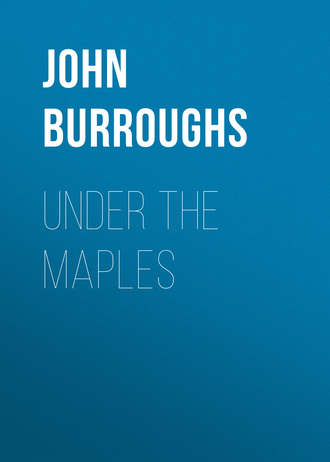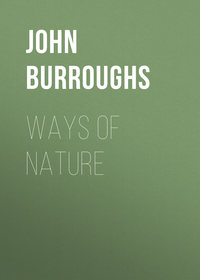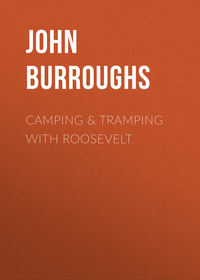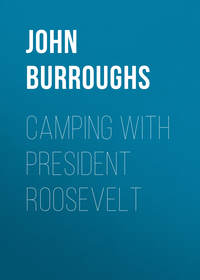 полная версия
полная версияUnder the Maples
Has the course of life up through geologic time been in any way like this? There has been the push of life, the effort to get somewhere, but has there been no more guiding principle than in the case of this worm? The singular thing about the worm is its incessant reachings forth into surrounding space, searching, searching, sounding, sounding, as if to be sure that no chance to make a new connection is missed.
Finally the black worm comes to rest and, clinging by its hind feet, lets itself down and simulates a small dry twig, in which disguise it would deceive the sharpest-eyed enemy. No doubt it passed the night posing as a twig.
Among the sylvan denizens that next came upon the stage were a hummingbird, a little red newt, and a wood frog. The hummer makes short work of everything: with a flash and a hum it is gone. This one seemed to be exploring the dry twigs for nesting-material, either spiders' webs or bits of lichen. For a brief moment it perched on a twig a few yards from me. My ardent wish could not hold it any longer. Truly a fairy bird, appearing and vanishing like a thought, familiar with the heart of all the flowers and taking no food grosser than their nectar, the winged jewel of the poets, the surprise and delight of all beholders – it came like a burnished meteor into my leafy alcove and was gone as quickly.
All sylvan things have a charm and delicacy of their own, all except the woodchuck; wherever he is, he is of the earth earthy. The wood frog is known only to woodsmen and farm boys. He is a real sylvan frog, as pretty as a bird, the color of the dry leaves, slender and elegant in form and quick and furtive in movement. My feet disturbed one in the bed of dry leaves. Slowly I moved my hand toward him and stroked his back with a twig. If you can tickle a frog's back in any way you put a spell upon him. He becomes quite hypnotized. He was instantly responsive to my passes. He began to swell and foreshorten, and when I used my finger instead of the twig, he puffed up very rapidly, rose up more upon his feet, and bowed his head. As I continued the titillation he began to give forth broken, subdued croaks, and I wondered if he were going to break out in song. He did not, but he seemed loath to go his way. How different he looked from the dark-colored frogs which in large numbers make a multitudinous croaking and clucking in the little wild pools in spring! He wakes up from his winter nap very early and is in the pools celebrating his nuptials as soon as the ice is off them, and then in two or three days he takes to the open woods and assumes the assimilative coloring of the dry leaves.
The little orange-colored salamander, a most delicate and highly colored little creature, is as harmless as a baby, and about as slow and undecided in its movements. Its cold body seems to like the warmth of your hand. Yet in color it is as rich an orange as the petal of the cardinal flower is a rich scarlet. It seems more than an outside color; it is a glow, and renders the creature almost transparent, an effect as uniform as the radiance of a precious stone. Its little, innocent-looking, three-toed foot, or three and a half toed – how unreptilian it looks through my pocket glass! A baby's hand is not more so. Its throbbing throat, its close-shut mouth, its jet-black eyes with a glint of gold above them – only a close view of these satisfies one.
Here is another remarkable transformation among the small wild folk. In the spring he is a dark, slimy, rather forbidding lizard in the pools; now he is more beautiful than the jewel-weed in the woods. This is said to be an immature form, which returns to the ponds and matures the next season; but whether it is the male or the female that assumes this bright hue, or both, I do not know. The coat seems to be its midsummer holiday uniform which is laid aside when it goes back to the marshes to hibernate in the fall.
Wild creatures so unafraid are sure to have means of protection that do not at once appear. In the case of the newt it is evidently an acrid or other disagreeable secretion, which would cause any animal to repent that took it in its mouth. It is even less concerned at being caught than is the skunk, or porcupine, or stink-bug.
In my retreat I was unwittingly intruding upon the domain of another sylvan denizen, the chipmunk. One afternoon one suddenly came up from the open field below me with his pockets full of provender of some sort; just what sort I wondered, as there was no grain or seeds or any dry food that it would be safe to store underground for the winter.
Beholding me sitting there within two yards of his den was a great surprise to him. He eyed me a long time – squirrel time – making little, spasmodic movements on the flat stone above his den. At a motion of my arm he darted into his hole with an exultant chip. He was soon out with empty pockets, and he then proceeded to sound his little tocsin of distrust or alarm so that all the sylvan folk might hear. As I made no sign, he soon ceased and went about his affairs.
All this time, behind and above me, concealed by a vase fern, reposed that lovely creature of the twilight, the luna moth, just out of her chrysalis, drying and inflating her wings. I chanced to lift the fern screen, and there was this marvel! Her body was as white and spotless as the snow, and her wings, with their Nile-green hue, as fair and delicate as – well, as only those of a luna moth can be. It is as immaculate as an angel. With a twig I carefully lifted her to the trunk of a maple sapling, where she clung and where I soon left her for the night.
While I was loitering there on the threshold of the woods, observing the small sylvan folk, about a hundred yards above me, near the highway, was a bird's nest of a kind I had not seen for more than a score of years, the nest of the veery, or Wilson's thrush. Some friends were camping there with their touring-car outfit in a fringe of the beech woods, and passed and repassed hourly within a few yards of the nest, and, although they each had sharp eyes and sharp ears, they had neither seen nor heard the birds during the two days they had been there.
While calling upon them I chanced to see the hurried movements of a thrush in the low trees six or seven yards away. The bird had food in its beak, which caused me to keep my eye upon it. It quickly flew down to a small clump of ferns that crowned a small knoll in the open, about ten feet from the border of the woods. As it did so, another thrush flew out of the ferns and disappeared in the woods. Their stealthy movements sent a little thrill through me, and I said, Here is a treasure. I parted the ferny screen, and there on the top of the small knoll was the nest with two half-fledged young.
A mowing-machine in a meadow in front of my door gave an unkind cut to a sparrow that had a nest in the clover near the wall. The mower chanced to see the nest before the sickle-bar had swept over it. It contained four young ones just out of the shell. At my suggestion the mower carefully placed it on the top of a stone wall. The parent birds were not seen, but we naturally reasoned that they would come back and would alight upon the wall to make observations.
But that afternoon and the next morning passed, and we saw no anxious bird parents. The young lifted up their open mouths whenever I looked into the nest and seemed to be more contented than abandoned birds usually are. The next night was unseasonably cold, and I expected to find the nestlings dead in the morning; but they were not, and, strangely enough, for babes in the wood or rather on a stone wall, they seemed to be doing well. Maybe the mother bird is still caring for them, I said to myself, and I ambushed myself across the road opposite to them and watched.
I had not long to wait. The mother sparrow came slyly up and dropped some food into an open mouth and disappeared.
Who does not feel a thrill of pleasure when, in sauntering through the woods, his hat just brushes a vireo's nest? This was my experience one morning. The nest was like a natural growth, hanging there like a fairy basket in the fork of a beech twig, woven of dry, delicate, papery, brown and gray wood products, just high enough to escape prowling ground enemies and low enough to escape sharp-eyed tree enemies. Its safety was in its artless art. It was a part of the shadows and the green-and-brown solitude. The weaver had bent down one of the green leaves and made it a part of the nest; it was like the stroke of a great artist. Then the dabs of white here and there, given by the fragments of spiders' cocoons – all helped to blend it with the flickering light and shade.
I gently bent down the branch and four confident heads with open mouths instantly appeared above the brim. The mother bird meanwhile was flitting about in the branches overhead, peering down upon me and uttering her anxious "quay quay," equivalent, I suppose, to saying: "Get away!" This I soon did.
Most of our bird music, like our wild flowers, is soon quickly over. But the red-eyed vireo sings on into September – not an ecstatic strain, but a quiet, contented warble, like a boy whistling at his work.
VII
WITH ROOSEVELT AT PINE KNOT
It was in May during the last term of his Presidency that Roosevelt asked me to go with him down to Pine Knot, Virginia, to help him name his birds. I stayed with him at the White House the night before we started. I remember that at dinner1 there was an officer from the British army stationed in India, and the talk naturally turned on Indian affairs. I did not take part in it because I knew nothing about India, but Roosevelt was so conversant with Indian affairs and Indian history that you would think he had just been cramming on it, which I knew very well he had not. But that British officer was put on his mettle to hold his own. In fact, Roosevelt knew more about India and England's relation to it than the officer seemed to know. It was amazing to see the thoroughness of his knowledge about India.
The next morning we started off for Virginia, taking an early train.
Pine Knot is about one hundred miles from Washington. I think we left the train at Charlottesville, Virginia, and drove about ten miles to Pine Knot; the house is a big barnlike structure on the edge of the woods, a mile from the nearest farmhouse.
Before we reached there we got out of the wagon and walked, as there were a good many warblers in the trees – the spring migration was on. It was pretty warm; I took off my overcoat and the President insisted on carrying it. We identified several warblers there, among them the black-poll, the black-throated blue, and Wilson's black-cap. He knew them in the trees overhead as quickly as I did.
We reached Pine Knot late in the afternoon, but as he was eager for a walk we started off, he leading, as if walking for a wager. We went through fields and woods and briers and marshy places for a mile or more, when we stopped and mopped our brows and turned homeward without having seen many birds.
Mrs. Roosevelt took him to task, I think, when she saw the heated condition in which we returned, for not long afterwards he came to me and said: "Oom John, that was no way to go after birds; we were in too much of a hurry." I replied, "No, Mr. President, that isn't the way I usually go a-birding." His thirst for the wild and the woods, and his joy at returning to these after his winter in the White House, had evidently urged him on. He added, "We will try a different plan to-morrow."
So on the morrow we took a leisurely drive along the highways. Very soon we heard a wren which was new to me. "That's Bewick's wren," he said. We got out and watched it as it darted in and out of the fence and sang.
I asked him if he knew whether the little gray gnatcatcher was to be seen there. I had not seen or heard it for thirty years. "Yes," he replied, "I saw it the last time I was here, over by a spring run."
We walked over to some plum-trees where there had been a house at one time. No sooner had we reached the spot than he cried, "There it is now!" And sure enough, there it was in full song – a little bird the shape of a tiny catbird, with a very fine musical strain.
As we were walking in a field we saw some birds that were new to me. Roosevelt also was puzzled to know what they were till we went among them and stirred them up, discovering that they were females of the blue grosbeak, with some sparrows which we did not identify.
In the course of that walk he showed me a place where he had seen what he had thought at the time to be a flock of wild pigeons. He described how they flew, the swoop of their movements, and the tree where they alighted. I was skeptical, for it had long been thought that wild pigeons were extinct, but that fact had not impressed itself upon his mind. He said if he had known there could be any doubt about it, he would have observed them more closely. I was sorry that he had not, as it was one of the points on which I wanted indisputable evidence. We talked with the colored coachman about the birds, as he also had seen them. His description agreed with Roosevelt's, and he had seen wild pigeons in his youth; still I had my doubts. Subsequently Roosevelt wrote me that he had come to the conclusion that they had been mistaken about their being pigeons.
One day while there, as we were walking through an old weedy field, I chanced to spy, out of the corner of my eye, a nighthawk sitting on the ground only three or four yards away. I called Roosevelt's attention to it and said, "Now, Mr. President, I think with care you can drop your hat over that bird." So he took off his sombrero and crept up on the bird, and was almost in a position to let his hat drop over it when the bird flew to a near tree, alighting lengthwise on the branch as this bird always does. Roosevelt approached it again cautiously and almost succeeded in putting his hand upon it; the bird flew just in time to save itself from his hand.
One Sunday after church he took me to a field where he had recently seen and heard Lincoln's sparrow. We loitered there, reclining upon the dry grass for an hour or more, waiting for the sparrow, but it did not appear.
During my visit there we named over seventy-five species of birds and fowl, he knowing all of them but two, and I knowing all but two. He taught me Bewick's wren and the prairie warbler, and I taught him the swamp sparrow and one of the rarer warblers; I think it was the pine warbler. If he had found the Lincoln sparrow again, he would have been one ahead of me.
I remember talking politics a little with him while we were waiting for the birds, and, knowing that he was expecting Taft to be his successor, I expressed my doubts as to Taft's being able to fill his shoes.
"Oh, yes, he can," he said confidently; "you don't know him as well as I do."
"Of course not," I admitted; "but my feeling is that, though Taft is an able and amiable man, he is not a born leader."
(I am glad to say that Mr. Taft's recent course in support of the proposed League of Nations has quite brought me around to Roosevelt's estimate of him.)
Pine Knot is a secluded place in the woods. One evening as we sat in the lamplight, he reading Lord Cromer on Egypt, and I a book on the man-eating lions of Tsavo, and Mrs. Roosevelt sitting near with her needlework, suddenly Roosevelt's hand came down on the table with such a bang that it made us both jump, and Mrs. Roosevelt exclaimed in a slightly nettled tone, "Why, my dear, what is the matter?"
He had killed a mosquito with a blow that would almost have demolished an African lion.
It occurred to me later that evening how risky it was for the President of the United States to be so unprotected – without a guard of any kind – in that out-of-the-way place, and I expressed something of this to him, suggesting that some one might "kidnap" him.
"Oh," he answered, slapping his hand on his hip pocket, "I go armed, and they would have to be mighty quick to get the drop on me."
Shortly after that, to stretch my legs a little and listen to the night sounds in the Virginia woods, I went out around the cabin and almost immediately heard some animal run heavily through the woods not far from the house. I thought perhaps it was a neighboring dog, but, on speaking of it to Mrs. Roosevelt, was told that two secret service men came every night at nine o'clock and stood on guard till morning, spending the day at a farmhouse in that vicinity. She did not let the President know of this because it would irritate him.
The only flower we saw there which was new to me was the Indian pink. Roosevelt seemed to know the flowers as well as he did the birds. Pink moccasin-flowers and the bird's-foot violet were common in that locality.
On our return trip, Roosevelt's secretary being on the train, Roosevelt threw himself into the dictation of many letters, the wrens and the warblers already sidetracked for the business of the Administration.
I passed another night at the White House, and in the morning early we went out on the White House grounds to look for birds, our quest seeming to attract the puzzled attention of the passers-by.
"They often stare at me as though they thought me crazy," he said, "when they see me gazing up into the trees."
"Well, now they will think I am your keeper," I said.
"Yes, and I your nurse," laughed Mrs. Roosevelt.
When I left, Roosevelt gave me a list of the birds that we had seen while at Pine Knot and hoped that I would sometime write up the trip; in fact, for years after, whenever we would meet, almost the first thing he would say was, "Have you written up our Pine Knot trip yet, Oom John?" And his disappointment at my failure to do so was always unmistakable.2
VIII
A STRENUOUS HOLIDAY
One August a few years ago (1918) I set out with some friends for a two weeks' automobile trip into the land of Dixie – joy-riders with a luxurious outfit calculated to be proof against any form of discomfort.
We were headed for the Great Smoky Mountains in North Carolina. I confess that mountains and men that do not smoke suit me better. Still I can stand both, and I started out with the hope that the great Appalachian range held something new and interesting for me. Yet I knew it was a risky thing for an octogenarian to go a-gypsying, and with younger men. Old blood has lost some of its red corpuscles, and does not warm up easily over the things that moved one so deeply when one was younger. More than that, what did I need of an outing? All the latter half of my life has been an outing, and an "inning" seemed more in order. Then, after fourscore years, the desire for change, for new scenes and new people, is at low ebb. The old and familiar draw more strongly. Yet I was fairly enlisted and bound to see the Old Smokies.
Pennsylvania is an impressive State, so vast, so diversified, so forest-clad – the huge unbroken Alleghany ranges with their deep valleys cutting across it from north to south; the world of fine farms and rural homesteads in the eastern half, and the great mining and manufacturing interests in the western, the source of noble rivers; and the storehouse of many of Nature's most useful gifts to man.
The great Lincoln Highway, of course, follows the line of least resistance, but it has some formidable obstacles to surmount, and it goes at them very deliberately; and, in a powerful car, gives one a sense of easy victory. But I smile as I remember persons with lighter cars standing beside them at the foot of those long, winding ascents, nursing and encouraging them, as it were, and preparing them for the heavy task before them. An almost perfect road, worthy of its great namesake, but an Alleghany range which you cannot get around or through gives the automobilist pause.
As we were hurled along over the great highway the things I remember with the most satisfaction were the groups or processions of army trucks we met coming east. The doom of kaiserism was written large on that Lincoln Highway in that army of resolute, slow-moving army trucks. Dumb, khaki-colored fighters on wheels, staunch, powerful-looking, a host of them, rolling eastward toward the seat of war, some loaded with soldiers, some with camp equipments, and all hinting of the enormous resources the fatuous Kaiser had let loose upon himself in this far-off land. On other highways the weapons and materials of war were converging toward the great seaports in the same way. The silent, grim, processions – how impressive they were!
Pittsburgh is a city that sits with its feet in or very near the lake of brimstone and fire, and its head in the sweet country air of the hill-tops. I think I got nearer the infernal regions there than I ever did in any other city in this country. One is fairly suffocated at times driving along the public highway on a bright, breezy August day. It might well be the devil's laboratory. Out of such blackening and blasting fumes comes our civilization. That weapons of war and of destructiveness should come out of such pits and abysses of hell-fire seemed fit and natural, but much more comes out of them – much that suggests the pond-lily rising out of the black slime and muck of the lake bottoms.
We live in an age of iron and have all we can do to keep the iron from entering our souls. Our vast industries have their root in the geologic history of the globe as in no other past age. We delve for our power, and it is all barbarous and unhandsome. When the coal and oil are all gone and we come to the surface and above the surface for the white coal, for the smokeless oil, for the winds and the sunshine, how much more attractive life will be! Our very minds ought to be cleaner. We may never hitch our wagons to the stars, but we can hitch them to the mountain streams, and make the summer breezes lift our burdens. Then the silver age will displace the iron age.
The western end of Pennsylvania is one vast coal-mine. The farmer has only to dig into the side of the hill back of his house and take out his winter's fuel. I was surprised to see how smooth and gentle and grassy the hills looked. It is a cemetery of the old carboniferous gods, and it seems to have been prepared by gentle hands and watched over with kindly care. Good crops of hay and grain were growing above their black remains, and rural life seemed to go on in the usual way. The shuffling and the deformation of the earth's surface which attended the laying down of the coal-beds is not anywhere evident. The hand of that wonderful husbandman, Father Time, has smoothed it all out.
Our first camp was at Greensborough, thirty or more miles southeast of Pittsburgh, an ideal place – a large, open oak grove on a gentle eminence well carpeted with grass, with wood and water in abundance. But the night was chilly. Folding camp-cots are poor conservers of one's bodily warmth, and until you get the hang of them and equip yourself with plenty of blankets, Sleep enters your tent very reluctantly. She tarried with me but briefly, and at three or four in the morning I got up, replenished the fire, and in a camp-chair beside it indulged in the "long, long thoughts" which belong to age much more than to youth. Youth was soundly and audibly sleeping in the tents with no thoughts at all.
The talk that first night around the camp-fire gave us an inside view of many things about which we were much concerned. The ship question was the acute question of the hour and we had with us for a few days Commissioner Hurley, of the Shipping Board, who could give us first-hand information, which he did to our great comfort.
Our next stop was near Uniontown, Pennsylvania, where for that night we slept indoors.
On the following day one of the big cars had an accident – the fan broke, and the iron punctured the radiator. It looked as if we should be delayed until a new radiator could be forwarded from Pittsburgh. We made our way slowly to Connellsville, where there was a good garage, but the best workmen there shook their heads; they said a new radiator was the only remedy. All four arms of the fan were broken off and there was no way to mend them. This verdict put Mr. Ford on his mettle. "Give me a chance," he said, and, pulling off his coat and rolling up his sleeves, he fell to work. In two hours we were ready to go ahead. By the aid of drills and copper wire the master mechanic had stitched the severed arms to their stubs, soldered up the hole in the radiator, and the disabled car was again in running order.









